|
|
|
Sort Order |
|
|
|
Items / Page
|
|
|
|
|
|
|
| Srl | Item |
| 1 |
ID:
085136
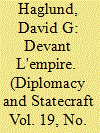

|
|
|
|
|
| Publication |
2008.
|
| Summary/Abstract |
Many observers of contemporary French politics would find it difficult to resist the temptation to conclude that France, alone among the European allies of the United States, has consistently had the greatest difficulty in adjusting to the reality of America's power. When that power occasions, as it frequently does, debates about "American empire," French opposition to American influence seems to become even more pronounced. In fact, there has in recent decades been a distinctive French negative assessment of the merits of American empire, but it would be a mistake, or so this paper argues, to assume that French interests have invariably been at odds either with American power or with American empire. Using four eponymous figures to illustrate the French perspective on American empire in the past 100 years, this essay highlights how and why that assessment has evolved.
|
|
|
|
|
|
|
|
|
|
|
|
|
|
|
|
| 2 |
ID:
085130
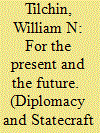

|
|
|
|
|
| Publication |
2008.
|
| Summary/Abstract |
Abstract "It is difficult to escape the conclusion," this historian has claimed in previous writings, "that in the foreign policy arena [Theodore] Roosevelt was probably the greatest of all US presidents." Such a laudatory interpretation is built on an assessment of both the record achieved by Rooseveltian diplomacy during the years of Roosevelt's presidency and the long-term significance of TR's statecraft. In its own time Roosevelt's foreign policy success grew out of a sophisticated understanding of a complex international environment, a well-conceived perspective on America's interests within that environment, and a multitude of attributes in the realm of execution that usually enabled Roosevelt, even in the most challenging cases, to attain the results he was seeking. As to its long-range importance, Rooseveltian statecraft was anchored to three precepts that might be labeled the "precept of broadly defined US interests," the "precept of US power," and the "precept of Anglo-American leadership." By conducting a foreign policy grounded on these precepts, Roosevelt - certainly well ahead of the great majority of his contemporaries - anticipated the type of foreign policy approach that would become and has remained the foundation for the practice of statecraft by many Republican and Democratic presidents and their most influential advisers from 1939 to the present day.
|
|
|
|
|
|
|
|
|
|
|
|
|
|
|
|
| 3 |
ID:
085137
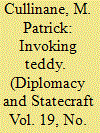

|
|
|
|
|
| Publication |
2008.
|
| Summary/Abstract |
Since John McCain's first aspirations for the presidency became public in 1999, he has often indicated his affinity for Theodore Roosevelt as his role model. Though McCain is not alone in admiring Roosevelt, his 2008 bid for the White House offers an opportunity to observe Roosevelt's legacy, and particularly how that legacy has impacted foreign policy thinking. The central argument of this article is that John McCain's impression of Roosevelt is as a composite of realist and idealist standpoints. This perception of Roosevelt is outlined in McCain's own publications and in his advocacy for foreign policy as a representative, senator, and presidential contender in both 2000 and 2008. John McCain's own style of statecraft is also conducted in full recognition of the legacy of Theodore Roosevelt
|
|
|
|
|
|
|
|
|
|
|
|
|
|
|
|
| 4 |
ID:
085128


|
|
|
| 5 |
ID:
085132


|
|
|
|
|
| Publication |
2008.
|
| Summary/Abstract |
The acquisition of the Philippines in the wake of the Spanish-American War gave Theodore Roosevelt's presidency an unprecedented mandate for conflict resolution, post-war reconstruction and development through modernization and democratization. A network of bilateral inter-colonial relations contributed to the extension of triangular transatlantic reciprocal influence. The lessons of America's continental empire-building, assessment of competing colonial experiments, and modern attempts at public diplomacy fed into a strategy of preventive containment of Japanese expansionism through popular consent. The intention was to institute an enduring "special relationship" to build up America's power in the Pacific, and to transform the Philippines into a model that would then "naturally" expand into a transcontinental informal empire by proxy.
|
|
|
|
|
|
|
|
|
|
|
|
|
|
|
|
| 6 |
ID:
082809


|
|
|
|
|
| Publication |
2008.
|
| Summary/Abstract |
Diplomacy is one of the oldest human institutions, with diplomatic records dating back to some of the earliest civilizations. At present, the methods and content of diplomatic history have much to offer modern scholars, but the field as a whole suffers from being out of step, philosophically, with the mainstream of historical and political-scientific study. The departure of diplomatic history from the philosophical mainstream both of political science and of history in general has left the field in dire straits. Fallen from its former grace, diplomatic history requires a new vision: not a groundbreaking, original vision, but a vision informed by previous generations, adapting their foundational principles to the ideals and demands of the twenty-first century academy. It is thus not only the Grand Tradition itself, but its ethos that must be preserved, in order to retain the distinguishing character and methods of diplomatic and military history as independent, politically moderate academic disciplines, regardless of their reputation among neighboring fields.
|
|
|
|
|
|
|
|
|
|
|
|
|
|
|
|
| 7 |
ID:
020611


|
|
|
|
|
| Publication |
Dec 2001.
|
| Description |
53-80
|
|
|
|
|
|
|
|
|
|
|
|
|
|
|
|
| 8 |
ID:
085129
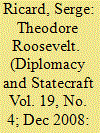

|
|
|
|
|
| Publication |
2008.
|
| Summary/Abstract |
This article argues that as the first modern US president and an innovative shaper of American foreign relations, Theodore Roosevelt launched the rising United States on the world stage as a major actor in power politics, that American diplomacy came of age with him and not with Woodrow Wilson, and that the secular pragmatist who succeeded because he was abreast of the times should not be begrudged the laurels that are so often bestowed on the religious-minded visionary who failed because he was ahead of his time. In American historiography Wilson has often eclipsed-unfairly and erroneously-the geopolitical and diplomatic skills, professionalism and expertise in foreign policy of Roosevelt. Even as ex-president, Roosevelt would be a force to be reckoned with. The use and misuse of a misconstrued legacy that some have tried to confiscate for their own benefit is perhaps best illustrated by presidential candidate John McCain's reverential claim that he is "a Teddy Roosevelt Republican" rather than a neo-Wilsonian.
|
|
|
|
|
|
|
|
|
|
|
|
|
|
|
|
| 9 |
ID:
085135
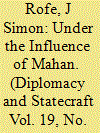

|
|
|
|
|
| Publication |
2008.
|
| Summary/Abstract |
This article explores links in the grand strategic outlook of Theodore Roosevelt and Franklin Roosevelt, with particular reference to the influence upon both men of Admiral Alfred Thayer Mahan. It focuses upon an episode during Franklin Roosevelt's tenure as Assistant Secretary of the Navy, when he was in direct correspondence with both Theodore and Mahan on matters of grand strategy and naval policy. The paper argues that Theodore Roosevelt proved a crucial conduit in the formulation of Franklin Roosevelt's grand strategic outlook, both through his promulgation of Mahanian thought and his support of Franklin's correspondence with the Admiral. This in turn would be important later during Franklin Roosevelt's leadership of the United States.
|
|
|
|
|
|
|
|
|
|
|
|
|
|
|
|
| 10 |
ID:
085133
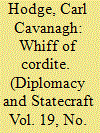

|
|
|
|
|
| Publication |
2008.
|
| Summary/Abstract |
Theodore Roosevelt's most enduring contribution to American power and influence in the world was in the promotion and construction of a blue water navy. Although much has been written about Roosevelt's notion of a uniquely American imperial vocation, as well as of his social Darwinist conception of Great Power competition, the priority he awarded to American naval power was based above all on a dispassionate and pessimistic interpretation of the direction of international affairs between 1890 and 1909. Bracketed by the inauguration of German Weltpolitik on the one hand and the Japanese naval triumph at Tsushima on the other, Roosevelt's naval policy was not the product of a romantic imperial imagination but rather of a wholly objective appreciation of the most fundamental imperative of American national security for the near and distant future.
|
|
|
|
|
|
|
|
|
|
|
|
|
|
|
|
|
|
|
|
|